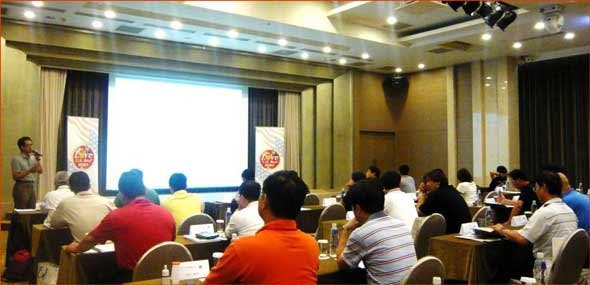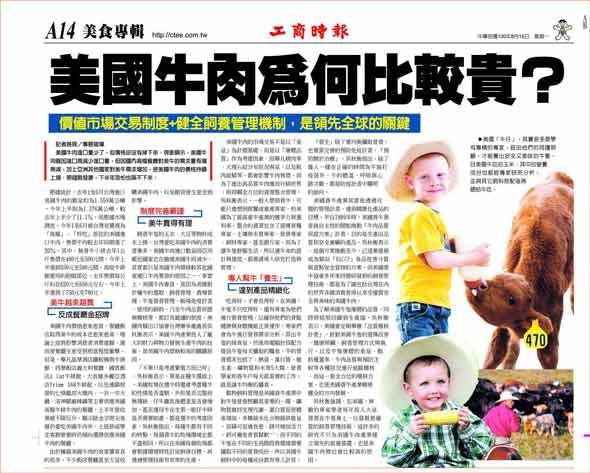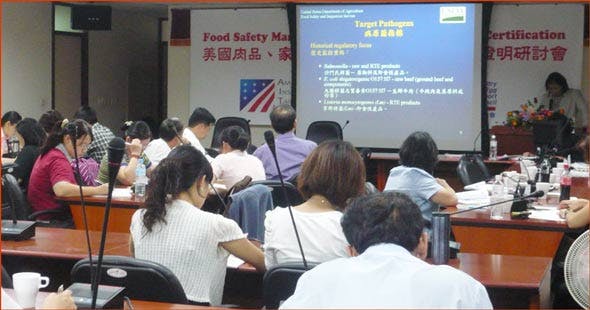USMEF-Taiwan Working on Many Fronts to Bolster U.S. Beef Demand
Published: Aug 24, 2011
While Taiwanese consumers still have a strong appetite for U.S. beef, the issue of ractopamine residues has slowed the momentum of U.S. beef exports to Taiwan and raised some product safety concerns among consumers. To help importer and distributor sales staff properly address any concerns raised by their retail and foodservice clientele, USMEF is providing educational training and product information.
With funding support from the Beef Checkoff Program and the USDA Market Access Program (MAP), recent USMEF educational seminars attracted more than 100 new sales staff from Taiwan’s major beef importers and wholesalers. The program was tailored toward helping new employees present a positive image of U.S. beef and address any misperceptions or misinformation that may have spread among their customer base.
With funding support from the Beef Checkoff Program and the USDA Market Access Program (MAP), recent USMEF educational seminars attracted more than 100 new sales staff from Taiwan’s major beef importers and wholesalers. The program was tailored toward helping new employees present a positive image of U.S. beef and address any misperceptions or misinformation that may have spread among their customer base.

USMEF-Taiwan Marketing Manager Alex Sun opened the program with a “from farm to table” presentation that included an overview of the U.S. cattle industry, beef processing safeguards, the USDA grading and inspection system and a discussion of global beef supply and demand. Sun also explained the important role the U.S. plays in Taiwan’s imported beef market.
USMEF also invited two well-known food writers, Hu Tian-Lan and Yao Shun, to familiarize the group with Taiwan’s current dining trends and patterns they foresee in the foodservice market. Ma Shi-Ping, a media consultant, advised the group about proper techniques in addressing any negative publicity or misinformation that surfaces about their products.
“Assisting our importers and distributors by providing this educational training to their new sales staff is a critical step,” said USMEF-Taiwan Director Davis Wu. “But it is really only the beginning. We will also be working with our partners in the retail and foodservice sectors to ensure that sound, factual information about U.S. beef is available at every level of the industry and that they are equipped to share it with their end-user customers.”

USMEF has also launched a series of new Beef Checkoff-funded “farm to table” advertisements in leading printing media outlets to promote the superior quality and positive attributes of U.S. beef, while explaining various aspects of the U.S. food safety system and programs such as Beef Quality Assurance (BQA) that have helped make the United States the world’s leading beef exporter in 2011.
“Despite recent negative publicity, Taiwanese consumers love U.S. beef and are very receptive to these positive, educational messages,” Wu explained.
Another important role for USMEF is to maintain constructive dialogue and relationships with regulatory and administrative officials whose agencies oversee the food trade in Taiwan. As part of this effort, USMEF teamed with the American Institute in Taiwan (AIT) and the USA Poultry and Egg Export Council (USAPEEC) for a series of outreach sessions with officials from the Taiwan Food and Drug Administration and inspectors from the Taiwan Council of Agriculture’s Bureau of Animal and Plant Health Inspection and Quarantine.
Dr. Vivian Chen and Dr. Charmaine McGee from FSIS offered presentations on U.S. testing programs and standards and the FSIS inspection system, while also exchanging information on import procedures. These sessions covered issues related to U.S. beef, pork and poultry, using funding support provided by MAP.
“The timing of this series was very important in light of the current debate in Taiwan about ractopamine standards,” said Jeffrey Hesse, AIT Agricultural Section Chief.

“Our objective is to provide science-based information and ensure that the nation’s commercial supply of meat, poultry and egg products is safe, wholesome, and correctly labeled and packaged for the foreign markets,” added Dr. McGee.
Attendees at the sessions raised questions on several key issues, including the adequacy of current U.S. export documentation, consistency of FSIS certificates, and the progress being made toward the implementation of an electronic health certificates issuance system.
USAPEEC staff provided a presentation on U.S. poultry production, while Kevin Smith, USMEF director of export services, focused on the U.S. red meat industry’s food safety innovations and strategies. He also provided detailed information on beta agonists, reinforcing the safety of U.S. beef and pork products.
“FSIS sessions in Taiwan are a very valuable activity, not just for exchanging information, but also in explaining basic U.S. red meat industry characteristics,” said Smith. “One of our biggest challenges in Taiwan is to help develop consistent trade procedures and inspection policies that will foster a positive business climate in this market for U.S. producers and exporters of red meat.”
